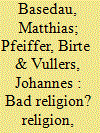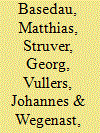|
|
|
Sort Order |
|
|
|
Items / Page
|
|
|
|
|
|
|
| Srl | Item |
| 1 |
ID:
143344


|
|
|
|
|
| Summary/Abstract |
Anecdotal evidence from many armed conflicts suggests that religion incites violence. Theoretically speaking, several facets of religion can create motives and opportunities to overcome the collective action problems associated with organized violence. However, empirical research has hitherto found no conclusive answer on the extent to which religion is connected to armed conflict onset. Contributing to the filling of this gap, we use a new database that incorporates important religious factors that previous studies left largely untested. The data set covers 130 developing countries for the period 1990 to 2010. Results from logistic regressions confirm our expectation that certain religious factors fuel armed conflict—in particular, the overlap of religious and other identities, religious groups’ grievances, and religious leaders’ calls for violence. We also find that religious determinants vary in their impact according to whether conflicts are religious or not in origin.
|
|
|
|
|
|
|
|
|
|
|
|
|
|
|
|
| 2 |
ID:
109142


|
|
|
|
|
| Publication |
2011.
|
| Summary/Abstract |
Theoretically, the "mobilization hypothesis" establishes a link between religion and conflict by arguing that particular religious structures are prone to mobilization; once politicized, escalation to violent conflict becomes more likely. Yet, despite the religious diversity in sub-Saharan Africa and the religious overtones in a number of African conflicts, this assumption has not yet been backed by systematic empirical research on the religion-conflict nexus in the region. The following questions thus remain: Do religious factors significantly impact the onset of (religious) armed conflict? If so, do they follow the logic of the mobilization hypothesis and, if so, in which way? To answer these questions, this article draws on a unique data inventory of all sub-Saharan countries for the period 1990-2008, particularly including data on mobilization-prone religious structures (e.g., demographic changes, parallel ethno-religious identities) as well as religious factors indicating actual politicization of religion (e.g., inter-religious tensions, religious discrimination, incitement by religious leaders). Logit regressions suggest that religion indeed plays a significant role in African armed conflicts. These findings are compatible with the mobilization hypothesis, and stress the impact of conflict-prone religious structures, and particularly, the fact that overlaps of religious and ethnic identities are conflict-prone. Future research should investigate the religion-ethnicity-nexus in more detail.
|
|
|
|
|
|
|
|
|
|
|
|
|
|
|
|
| 3 |
ID:
126020


|
|
|
|
|
| Publication |
2013.
|
| Summary/Abstract |
Despite the frequent failure of mediation efforts, the potential negative impact of this outcome on conflict dynamics in civil wars has not been systematically studied. Starting from the assumption that the failure of mediation may cause the conflict parties to conclude that non-violent strategies are ineffective, we develop a rationalist model to explain under what conditions mediation failure might lead to the escalation of violence. Shifts in the degree of negotiability of the conflict parties' goals and in the balance of their internal structure (relative strength of hardliners and moderates) are taken as explanatory variables. We test our hypotheses with a qualitative comparison of 23 cases of failed civil war mediation from around the globe. While shifting goals are rarely observed, it is shown how the strengthening of hardliners in the wake of mediation failure has significant explanatory power.
|
|
|
|
|
|
|
|
|
|
|
|
|
|
|
|
| 4 |
ID:
123957


|
|
|
|
|
| Publication |
2013.
|
| Summary/Abstract |
Given its religious demography, sub-Saharan Africa seems particularly prone to the outbreak of violent clashes between Christians and Muslims. This article compares three sub-Saharan countries-Nigeria, Côte d'Ivoire, and Tanzania-that display different levels of inter-religious violence despite each having in common similar population ratios of Christians and Muslims, as well as all sharing a number of the classical risk factors for conflict onset. The analysis of these three case studies shows that higher levels of inter-religious violence result from horizontal inequalities and overlapping religious and ethnic group boundaries that, in the context of tense political transformation, consequently breed inter-religious grievances and violence. When theological ideas become politicized, inter-religious violence reaches its most intense level of expression.
|
|
|
|
|
|
|
|
|
|
|
|
|
|
|
|
|
|
|
|
|